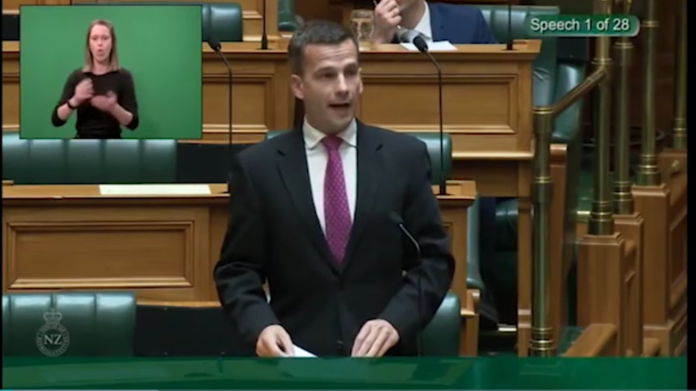The 3rd reading passed last night so we have a referendum.
David Seymour has done an outstanding job in shepherding this piece of legislation through and he has shown true political bridge building to bring together different spectrums of NZ politics. He has removed as many concerns of abuse as is possible and crafted a piece of legislation that is worthy of genuine concern and consideration.
Will this bill allow those in pain and with terminal illness the peace they deserve or will it become a loophole of coercion?
I admit to being terribly torn.
I Look at the appalling way the State ‘cares’ for the mentally ill, prisoners, beneficiaries, state tenants and wards of the state. In each case, the state deforms and maims the most vulnerable DESPITE having a duty of care.
Once you take the duty of care muzzle off the snarling state, the way euthanasia does, the coercion to allow the weakest and most vulnerable to die is a greased slippery slope.
I look forward to the debate as I am very open to hearing about what we should do here.






Bringing in “mentally ill, prisoners, beneficiaries, state tenants and wards of the state” is setting up a straw man argument. Physician-assisted dying is its own particular issue, not to be conflated with other hobby-horses, and to be judged, and voted upon, according to its own merits. Slippery slopes, or thin-ended wedges, have not been observed in the several other jurisdictions, and no reason to obsess that there could happen here.
Given that most polls hover around the 70% mark in favour, it would seem fairly predictable that the majority — the common sense of the common man — will have their wish (although the anticipated 2 year delay is unnecessary); and those against can, of course, have no bar of it.
One’s life is one’s own.
Well at what point do we devalue human life to the point where we say it’s okay to end it. Theres also new borns and the state forcing sterilisation on disabled woman. If the trait that triggers an assisted death is “suffering” then when is that trait not equalised in any other type of suffering. So we go along and we say yes your suffering is sufficient, and your suffering is sufficient and on and on and then your suffering is sufficient but oh sorry you’re to young or you were inebriated when you went into a comer. Like I don’t care about ego right now I just want to know when the trait fails to equalise.
” Slippery slopes, or thin-ended wedges, have not been observed in the several other jurisdictions, and no reason to obsess that there could happen here.”
Seriously? Be really good if you could cite some references in support of that claim.
What has happened in the Netherlands? A right-to-die group has launched a service of 30 mobile teams that make house calls for people wanting to die but whose regular family doctors are unwilling to participate. This is a form of doctor shopping where people go from doctor to doctor till they get the desired diagnosis and/or prescription.
https://www.theglobeandmail.com/opinion/assisted-suicide-what-could-possibly-go-wrong/article16982181/
In Oregon, between 2001 and 2007 just three doctors wrote 23% of the death prescriptions.
https://link.springer.com/article/10.1007/s11606-019-05019-1
The main reason cited by advocates is to allow people to end the pain of their condition. However, surveys conducted in Oregon show that loss of dignity, loss of autonomy, loss of ability to do daily activities and the fear of being a burden are all more important than pain. What overt and covert pressures will be felt by people who don’t want to burden their families?
“The number of foreigners travelling to Zurich to kill themselves grew from just three in 2000 to 55 last year.”
https://www.researchgate.net/publication/236598994_Nonphysician-Assisted_Suicide_in_Switzerland
Is it a slippery slope? There are countries/states where euthanasia controls and rules of eligibility were tight at first but have subsequently eased. Mental illness and depression are now included in the rules in the Netherlands. Belgium has extended their law to include children: can children really make these decisions?
Well that’s the thing I don’t think the bill can be written with out sin. So the bill kind of says (I read the bill ages ago and don’t remember a thing So I’m just going off what Seymore reckons) so the bill is supposed to exclude people who are not old, on there death bed. So the doctor has to agree that the patient is dying and you can’t be young. But the trait they’re using is Suffering and what makes one persons suffering distinct from another. So say we have a child and everyone agrees that it would be better to end it rather than have them spasm out and die ages later in agony. It would still be a slippery slop if the parents was able to argue in the High Court that the definition of “suffering” ought apply to the child.
Typically defending an institutions leads people to defending evil as “moral.” When the “suffering” in question is torture, yes, of course. A torturer is someone who tortures. Not that condemning people to a slow, agonizing death is beneficial to anyone but sadists.
My mother has been an active “end of life choice” advocate for decades, joining the Voluntary Euthanasia Society as it was called, and still being involved in the later iterations into her late 80s. She says in her opinion, that many people will still fight for their last breath as they do now, and that many thousands will take great comfort from knowing there is another legal option if they do need it.
The issue of grasping relatives, or eugenics leaning state agency staff, is something that society and medical practitioners will have to treat most seriously, but is not a credible enough concern to deny a peaceful end to those that desire it.
Tiger Mountain Ditto, I’m a long time member of VES. My kids and I have had quite relaxed conversations about it, but because I cannot rely on them to say pull the plug, or not keep me on life support, I decided to turn that one over to my lawyer. Because their father died young, these sorts of conversations are important when children worry about losing the other parent too, and then the expanded conversations develop naturally over time.
I used to tell my son that if I had a stroke or went gaga to take me out to Castle Point and push me off, and he said that he couldn’t do that … but I hope he may be changing his mind…
The issue of grasping relatives making people feel that they’re a burden, is an official directive of the Catholic Church in NZ, and circulated to congregations nation wide, 2x.
I think that in my pro-euthanasia submission, I said that this dates back to the theology of St Augustine, who had a grim view of all of us, teaching that Original Sin is passed directly from the male during the act of intercourse, and hence, we are all born in a state of mortal sin. It is quite nice having something blamed on men, because it is usually Eve the temptress used to demonise women for leading men astray. But the Catholic Church in particular is totally fixated on the issue of greedy offspring bullying parents – but it’s much more complicated than that, and much harder.
It is not enough to just tell one’s doctor not to resuscitate, and not to keep one on life support, it has to be put in writing, and even then the hospital may ignore it – there was such a case at Wgtn Hospital last year, so I can see why some End of Life Choice people assemble their own death kits. Religious people are often scared of death, which is a great shame, because there’s nothing to be scared of – except in the manner of dying.
I think I can honestly say that I think I’ve been a burden to my kids ever since they reached the age of reason – but not continuously, just intermittently.
National MP and Zionist Alfred Ngaro is today blasting NZ First for “abdicating responsibility” by agreeing to have another euthanasia referendum. Ngaro thinks that it’s not democratic, but I think it’s pretty democratic – even if the majority of NZ’ers may think differently from Mr Ngaro.
The anti-referendum people may not realise that we’re not talking compulsory euthanasia here, we’re talking about freedom of choice, and I’m not willing to surrender my choice because other people are scared of going to hell – perhaps with good reason – or who know that their kids hate them. Maybe sox-pulling-up time.
Reduced income for the profitable Aged Care Industry, and the rich Pharmaceutical Companies, are not my battles to fight, and they have the money to fight for their own vested interests – and they do and will.
Snow White: “The anti-referendum people may not realise that we’re not talking compulsory euthanasia here, we’re talking about freedom of choice…”
I agree with your entire comment.
I’m pleased that the bill has passed, and congratulations to David Seymour. As a politician, he’s shown his worth in a way that most others will never do. Thanks to the way he’s performed in Parliament recently, I’m rapidly coming round to the idea of casting a vote for ACT.
However, I’m underwhelmed at the prospect of a referendum, because in my view it is politicians who are paid to make difficult decisions of that sort. It’s what they’re elected for; we the voters shouldn’t be having to do their job for them.
Secondly, I’d have preferred Seymour’s original bill to have been the version that was passed into law. In my view, the amended version deprives me of the ability to make a choice about the time of my dying. I’m not best pleased at that.
But even so, I’ll be voting yes. The amended bill is certainly better than the situation that we currently have.
“Euthanasia needs to be a referendum decision” – disagree, this is a matter where a far better decision would be reached by a Citizens’ Assembly.
Referenda reflect inch-deep, mile wide thinking. The so-called average person hasn’t put in the hours understanding the nuances of the argument pro and con. The scope for capture by strong lobbyists and personalities is huge – emotive, sound-bite decisions versus cooler, rational decision-making.
Citizens’ Assemblies allow a representative sample of the population to dig into the subject in detail without any party affiliation or long-term agendas around re-election, just dealing with the issue for the best outcome.
Sounds weird doesn’t it? Citizens Assemblies making these big decisions and yet. go into any courtroom for a major trial and who do you find deciding innocence or guilt?
Total waste of people’s time and a low-blow to people currently on death row in hospices waiting to die in awful pain. This referendum is going to pass regardless whether 70% vote for it or just 60%.
https://www.tvnz.co.nz/one-news/new-zealand/strong-support-legalising-euthanasia-in-1-news-colmar-brunton-poll-mps-set-thrash-details
As a strong supporter of voluntary euthanasia for terminally ill people (who choose it for themselves of their own volition!), I’d just like to sincerely thank Maggie Barry for being such an obstinate and obstructive old bag.
I’m sure that her nasty, bullying ways, where she’s tried to bulldoze over anyone else’s views but her own on this issue, have helped to bring many wavering people over to the ‘pro’ side of the ledger.
Cheers Mags!
simonm: “I’m sure that her nasty, bullying ways, where she’s tried to bulldoze over anyone else’s views but her own on this issue, have helped to bring many wavering people over to the ‘pro’ side of the ledger.”
Hear hear! I completely agree. She’s behaved like an interfering old mickey-drip: guaranteed to make people vote in favour, just out of sheer irritation.
She claims that her objections aren’t religious: you could have fooled me. That’s exactly how they sound. I remain unconverted to her way of thinking, I’m pleased to say.
Indeed, SimonM and D’esterre. In our post-Rogernomics world of Hyper Individualism, the last thing most people want to hear these days is “No, you CAN’T do that!”. Especially when, like abortion, it is presented as an issue of bodily autonomy.
The irony which Ms Barry and her colleagues have probably missed is that National promotes Hyper Individualism with gusto (remember the shower nozzle fiasco?) and its that cultural reality which will see the majority of NZers vote in favour.
Yes we have generally heartless neo liberal government in this country and no surprise high rates of suicide, mental illness and more. Yes its a slippery slope here because of the revolting way people are treated. In contrast to true Socialist democracies where people are treated with decency and respect.
That said as someone who has been on the receiving end of a terminally ill parent I hope it passes. Once again David Seymour putting a lot of other politicians to shame.
Well done.
A referendum to make such an important decision is so wrong. A wise decision will never be made by the ignorant and uninformed.
Ben – As you say, a wise decision will never be made by the ignorant and uninformed. That is precisely why it cannot be left in the hands of politicians.
Any assumption that politicians are well informed, or even particularly intelligent, is wishful thinking, that’s all. Many, if not most, are varying degrees of plain damned hopeless.
PS Folk filling in a referendum, will at least read it first. Most politicians don’t even read – they have aides to do their reading for them – which also makes it easier to later lie – their most finely honed skill.
Don’t agree with any of what you are saying. Pretty well every politician I have ever met has impressed me with their intellect and knowledge. I can’t say the same for people I have met in the pub or heard on talk back radio.
Ben – That you even listen to talk back radio, suggests that you may not exactly function in the upper echelons of intellectualism.
I’m trying not to be too harsh here, but associating politicians with intellect is pushing things – and other personal qualities such as kindness, compassion, and honesty are, I suggest, also basic qualities necessary to function as a healthy and constructive member of society – and more so for the politicians.
It’s great that you talk politics in pubs – I mean that – NZ pubs are not places I frequent, but can I suggest that you listen to Parliament instead of talk back on your radio, and then see if you can spot the difference.
Watch Parliament on television – they’re frequently idiotic, juvenile, and loutish – and sometimes alarming even to each other.
I doubt there’s any other work place in NZ – or even any school – where their bad behavior would be tolerated. Not exactly meetings of minds.
I’m a bit bewildered by allegations that coercion will be a problem. Parliament tightened the law so only the terminally ill are eligible (with a prognosis of six months or less to live) and given that two doctors have to agree (one of whom has to be independent and nominated by the Ministry of Health), it doesn’t seem all that likely that two doctors would be able to conspire to give a false prognosis.
There also seems to be a misapprehension that anyone with a six-months-or-less prognosis will immediately not only apply for an assisted death but will also take that option just as soon as possible. Dr Shane Reti seemed to suggest as much in the Third Reading debate by citing how much brilliant work composers such as Beethoven and Bach produced in their last six months of life and said that would have been lost to the world under Seymour’s bill.
In fact, assisted dying laws elsewhere have only shaved 10 days on average off a dying person’s life.
Nearly all want to continue living just as long as possible… with the knowledge the very end of life stage will not be harrowing. Beethoven and Bach would have been able to produce exactly the same work in their last six months, even if assisted dying had been available to them.
It made me wonder if Reti actually understood what the bill says and how such legislation has been used in other jurisdictions.
Reti’s “dying great composers” speech was weird and incoherent. I’m glad he’s not my doctor if that’s the best he can come up with.
Auē, Martyn! Coercion is what happens now. You’re coerced to have a horrible, horrible death. Why? Imagine being coerced to have surgery without anesthetic. That’s what it’s like for some people. Ask me. I’ve seen it. End of life choice will mean a loophole to opt out of coercion, not into it.
Comments are closed.